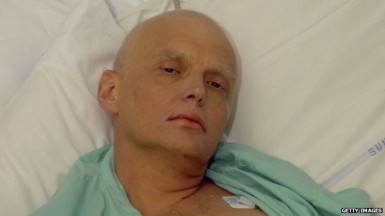LONDON, (Reuters) – President Vladimir Putin probably approved a 2006 Russian intelligence operation to murder ex-KGB agent Alexander Litvinenko with radioactive polonium-210 in London, a British inquiry concluded on Thursday, prompting a row with Moscow.

Russia, which had declined to cooperate in the inquiry, cautioned pointedly that it could “poison” relations. Britain accused the Kremlin of uncivilised behaviour but did not immediately signal it would take any stronger action.
Litvinenko, 43, an outspoken critic of Putin who fled Russia for Britain six years to the day before he was poisoned, died after drinking green tea laced with the rare and very potent radioactive isotope at London’s Millennium Hotel.
An inquiry led by senior British judge Robert Owen found that former KGB bodyguard Andrei Lugovoy and another Russian, Dmitry Kovtun, carried out the killing as part of an operation probably directed by Russia’s Federal Security Service (FSB), the main heir to the Soviet-era KGB.
“The FSB operation to kill Mr Litvinenko was probably approved by Mr Patrushev, then head of the FSB, and also by President Putin,” Owen said.
“I have concluded that there is a strong probability that when Mr Lugovoy poisoned Mr Litvinenko, he did so under the direction of the FSB. I have further concluded that Mr Kovtun was also acting under FSB direction,” he said.
Litvinenko’s death marked a post-Cold War low point in Anglo-Russian ties, marred further by Russia’s annexation of Crimea and support for Syrian President Bashar al-Assad. But Britain’s measured early response to the report appeared to acknowledge a need for Russia to exert its influence over Assad in negotiations to end the Syrian civil war.Prime Minister David Cameron said he would not rule out further action, but added:
“Do we at some level have to go on having some sort of relationship with them because we need a solution to the Syria crisis? Yes we do. But we do it with clear eyes and a very cold heart.”
Interior minister Theresa May, appearing before parliament, spoke of “a blatant and unacceptable breach of the most fundamental tenets of international law and of civilised behaviour”, while the opposition Labour Party described an “unparalleled act of state-sponsored terrorism”.
The image of Litvinenko lying on his bed at London’s University College Hospital, cadaverous and having lost his hair, was emblazoned across British and other Western newspapers and later shown to the inquiry. He took over three weeks to die.
From his deathbed, Litvinenko told detectives he believed Putin – a former KGB spy who went on to head the FSB before winning the presidency – had directly ordered his killing.
The Kremlin has always denied any involvement but the claim that Putin directly ordered a killing of an opponent with a radioactive isotope in a major Western capital provoked immediate censure from Moscow.









